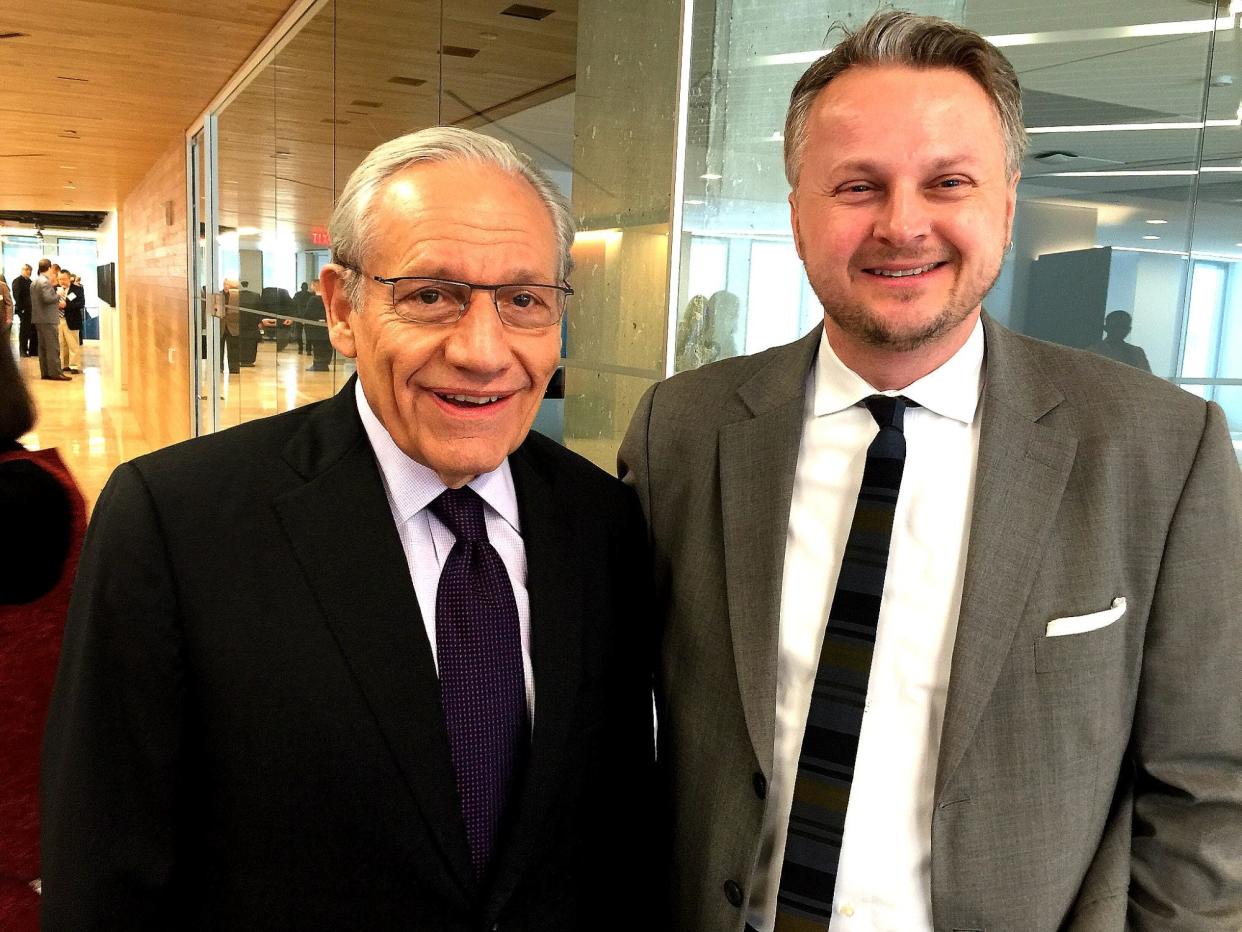You, too, can become a government watchdog by using these tips to 'follow the money'

- Oops!Something went wrong.Please try again later.
Investigative reporters have a mantra that has been repeated so often since Watergate it has become part of the American lexicon: "Follow the money."
Applying that dictum 18 months ago helped the Free Press alert Detroiters that Mayor Mike Duggan and five of the nine city council members considering whether to give an additional $60 million tax break to Dan Gilbert's signature downtown Hudson's site project had received $58,500 in campaign contributions from Gilbert and his political action committee.
That revelation — and the subsequent public outcry — prompted city council, which was scheduled to vote on the deal on the day our story broke, to instead delay its vote. Council members claimed they needed to do more homework, which amounted to another revelation, since a lot of folks figured council members did their homework before deciding whether to give a billionaire a big tax break. In the ensuing weeks, Gilbert's company sweetened the deal and, ultimately, won council approval.
I share this story because it demonstrates how democracy is supposed to work. The People, armed with information, demanded more from their government. And, in the end, they forced their elected officials to drive a harder bargain than they otherwise would have if they had not been exposed as pushovers who may have been influenced (a least a teensy-weensy bit) by large campaign contributions from someone seeking a big tax break.
After we followed the money and told you what we found, Gilbert's companies agreed to increase the amount of affordable housing at their Detroit properties and make those units even more affordable, pledged to dedicate 20% of the ground-level retail space at the Hudson's site for Detroit-based small businesses, provide $1 million to support those businesses and invest $5 million in a neighborhood improvement fund, and committed to help Detroit public school kids get internships.
Not every watchdog report yields such a bountiful harvest. And there aren't enough reporters to scrutinize every developer's request for a break from our local and state officials. But it also doesn't take a journalism degree, decades of experience holding public officials accountable, or a team of reporters to dig into the politicians and the players whose decisions and dollars impact all of us.
That's why I'm deputizing you to help us follow the money and hold public officials accountable. Read on to learn how it's done.
Welcome to the club, Junior Watchdog!
People often ask how I find stories; do I get tips or uncover them myself? It's a bit of both. It's easier to find stories if you know where to look. If you're wondering where that may be, consider the old joke about why people rob banks: Because that's where the money is.

When it comes to politics and government, a lot of the money is found in campaign finance reports. These are documents that candidates, political parties and entities created to influence public policy file on a regular basis disclosing where they got their money and how they spent it. These are public records anyone is welcome to scrutinize, though few do. There are wrinkles that require even veteran watchdogs to consult the experts on subjects like the different rules for local, state and federal candidates. Court rulings and lawmakers eternally seeking more campaign funds mean things like who can give and how much they can give are subject to change. But much of the basic information is easy to find, won't cost you a dime, and can be searched even after business hours when you're in your jammies enjoying hot cocoa with those itty-bitty marshmallows.
Our investigation into Gilbert's donations to Detroit officials started after I read my colleague JC Reindl's report that two council members recommended that the rest of the council should approve the new tax breaks. I knew one of those council members had accepted $10,000 in donations from Gilbert's Rock Holdings PAC, so I went to Wayne County's campaign finance website to see who else got dough from Gilbert.
You can find local candidates' campaign finance reports on many counties' campaign finance websites, as well as run searches to see who an individual or a political committee donated to. Because candidates are supposed to report where their donors work, you can even see who employees of specific companies gave their money to. (When we did this after our story ran, we learned that Gilbert executives had also donated to Detroit officials.) Unfortunately, many candidates fail to ask or report employer information for donors, so this is not an exact science. And here's a pro tip: Before you do a search, look for the drop-down menu for "Reporting Period" and click on "Select Reporting Period." This may seem odd, but it results in your search covering all reporting periods rather than a single reporting period. Many Michigan counties have campaign finance websites that work like Wayne County's which, if you're feeling really curious, also allows you to search for individuals and businesses who are getting money from candidates.
If you're looking for campaign finance information for judges, state representatives, state senators or statewide elected officials like the governor, attorney general or secretary of state, go to the Michigan Secretary of State's campaign finance website. You also can find information on committees that collect contributions and make donations, but we'll dive into that a little later. First, here's a few more pro tips: When you're on the Secretary of State's "Campaign Finance Disclosure" page, scroll down and try the "Contribution Analysis" link to search which candidate or PAC a specific individual has donated to. You can also use the "Expenditures Search" to see who is getting political funds. The "Committee Search" link will take you to campaign finance reports for candidates and political funds. For the "Committee Type" drop-down menu I recommend selecting "All Types" and under the "Include" drop-down menu I like to use "All Committees" so I can conduct the most thorough search possible.
Once you get a little familiar with these sites, they're pretty easy to use. While I was writing this column, I got a call from a source alleging that a business owner's campaign contributions influenced an elected official. During the 30 minutes we were on the phone, I used one of these campaign finance websites to see whether the business owner had made any contributions to the lawmaker. In a matter of minutes, I found that the business owner and three of his relatives each made a $1,000 contribution to the lawmaker on the same day. That alone is not proof of public corruption and, like all tips, this one will require a lot more investigating to determine whether there is a story here. I share this example merely to show you how quick and easy it can be to find potentially important information — if you know where to look for it.
Information on candidates for federal office — members of the U.S. House and Senate, as well as the president — can be found at the Federal Election Commission's website. I recommend clicking on the "Campaign finance data" link then clicking on "Candidates" on the drop-down menu. Click on "All candidates" to search for a specific candidate. In addition to tools to help you find a candidate's campaign finance reports as well as conduct searches for who is donating to whom and who is receiving campaign funds, under the "About this candidate" link the FEC lists leadership PACs candidates sponsor. Under "Candidate information" there is a link to a "Statement of candidacy" that lists committees beyond the candidate's campaign account that are authorized to raise and spend funds to support them.
The FEC site also lists independent expenditures made to support or oppose a candidate. For example, if you look up 12th District Congresswoman Rashida Tlaib and click on the "Spending by others to support or oppose" link, you'll see that in 2021 and 2022, independent groups spent nearly $50,000 supporting Tlaib and more than $140,000 opposing her. The spending is broken down by group, with links to the group's campaign finance reports.
Rabbit holes
For better or worse, there are all kinds of ways for people, organizations, unions and businesses to spend money they hope will influence the outcome of elections. Unfortunately, some of that fundraising and spending is not disclosed in public records.
Trying to keep it all straight could make your head explode.
There are independent committees, political action committees and Super PACs, which in Michigan register and file their campaign finance reports with counties or the Secretary of State, depending on their purpose. There are nonprofits and so-called leadership funds that file with the IRS and don't have to disclose where they got their dough or provide many details on how they spent it. There are dark money funds. OpenSecrets, a nonpartisan nonprofit that studies and analyzes money in politics, has a glossary that helps explain some of these entities.
OpenSecrets also offers helpful articles like "10 Things Every Voter Should Know" and "10 Things They Won't Tell You About Money in Politics."
Still, Jimmy Cloutier, who analyzes money and politics for Open Secrets, says it's tough to track every penny.
"Campaigns find new ways every year to, I don't want to say 'skirt campaign finance disclosure requirements,' but there's a lot of different ways that money can enter our political system," he told me. "Every year we're having to adapt in how we track this."
If you, like me, are disheartened to know it's virtually impossible to identify who is pulling some of the strings in our money-mad political puppet show, keep in mind that investigative reporting isn't like Pokemon: We know we can't "Catch 'em all."
Still, we try to get as many as we can.
So rather than quit before you've started, try using some of the tips I've shared and remember that every watchdog was once a puppy. You never know what you'll find until you start looking. And if you find something that looks really juicy, shoot me an email so you can join me — On Guard.
M.L. Elrick is a Pulitzer Prize- and Emmy Award-winning investigative reporter and host of the ML's Soul of Detroit podcast. Contact him at mlelrick@freepress.com or follow him on X at @elrick, Facebook at ML Elrick and Instagram at ml_elrick.
This article originally appeared on Detroit Free Press: Follow these free and easy tips to become a junior government watchdog
